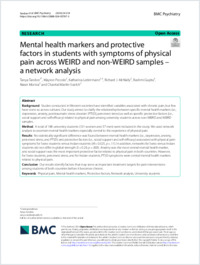Mental health markers and protective factors in students with symptoms of physical pain across WEIRD and non-WEIRD samples – a network analysis
PSPE
- Tandon, Tanya ORCID University of Fribourg, Switzerland
- Piccolo, Mayron Harvard University, USA
- Ledermann, Katharina University of Fribourg, Switzerland. University Hospital Zurich, Switzerland
- J. McNally , Richard Harvard University, USA
- Gupta, Rashmi Indian Institute of Technology Bombay, India
- Morina, Naser University Hospital Zurich, Switzerland
- Martin Soelch, Chantal ORCID University of Fribourg, Switzerland
- 2024
Published in:
- BMC Psychiatry. - Springer Science and Business Media LLC. - 2024, vol. 24, no. 318, p. 1-11
English
Background: Studies conducted in Western societies have identified variables associated with chronic pain, but few have done so across cultures. Our study aimed to clarify the relationship between specific mental health markers (i.e., depression, anxiety, posttraumatic stress disorder [PTSD], perceived stress) as well as specific protective factors (i.e., social support and self-efficacy) related to physical pain among university students across non-WEIRD and WEIRD samples. Method: A total of 188 university students (131 women and 57 men) were included in the study. We used network analysis to ascertain mental health markers especially central to the experience of physical pain. Results: No statistically significant difference was found between mental health markers (i.e., depression, anxiety, perceived stress, and PTSD) and protective factors (i.e., social support and self-efficacy) associated with physical pain symptoms for Swiss students versus Indian students (M = 0.325, p = .11). In addition, networks for Swiss versus Indian students did not differ in global strength (S = 0.29, p = .803). Anxiety was the most central mental health marker, and social support was the most important protective factor related to physical pain in both countries. However, for Swiss students, perceived stress, and for Indian students, PTSD symptoms were central mental health markers related to physical pain. Conclusion: Our results identify factors that may serve as important treatment targets for pain interventions among students of both countries before it becomes chronic.
- Faculty
- Faculté des lettres et des sciences humaines
- Department
- Département de Psychologie
- Language
-
- English
- Classification
- Psychology
- License
- Open access status
- gold
- Identifiers
-
- DOI 10.1186/s12888-024-05767-3
- ISSN 1471-244X
- Persistent URL
- https://folia.unifr.ch/unifr/documents/328942
Statistics
Document views: 120
File downloads:
- s12888-024-05767-3_1: 149
